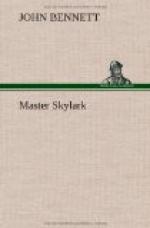How forlorn the green old dial looked out there alone in the cold, with the winter dust whirling around it in little eddies upon the wind! The dial was fringed with icicles, like an old man’s beard; and even the creeping shadow on its face, which told mid-afternoon, seemed frozen where it fell.
Mid-afternoon already, and he so much to do! Nick pulled his cloak about him, and turned to his song again:
“Sir Fly hangs
dead on the window-pane;
The frost
doth wind his shroud—”
But there he stopped; for the boys were singing in the great hall below, and the whole house rang with the sound of the roaring chorus:
“Down-a-down,
hey, down-a-down,
Hey derry
derry down-a-down!”
Nick put his fingers in his ears, and began all over again:
“Sir Fly hangs
dead on the window-pane;
The frost
doth wind his shroud;
Through the halls of
his little summer house
The north
wind cries aloud.”
But it was no use; all he could hear was:
“Down-a-down,
hey, down-a-down,
Hey derry
derry down-a-down!”
How could a fellow study in a noise like that? He gave it up in despair, and kicking the chunks together, stood upon the hearth, warming his hands by the gathering blaze while he listened to the song:
“Cold’s
the wind, and wet’s the rain;
Saint Hugh,
be our good speed!
Ill is the weather that
bringeth no gain,
Nor helps
good hearts in need.
“Down-a-down,
hey, down-a-down,
Hey derry
derry down-a-down!”
He could hear Colley Warren above them all. What a voice the boy had! Like a golden horn blowing in the fresh of a morning breeze. It made Nick tingle, he could not tell why. He and Colley often sang together, and their voices made a quivering in the air like the ringing of a bell. And often, while they sang, the viols standing in the corner of the room would sound aloud a deep, soft note in harmony with them, although nobody had touched the strings; so that the others cried out that the instruments were bewitched, and would not let the boys sing any more. Colley Warren was Nick’s best friend—a dark-eyed, quiet lad, as gentle as a girl, and with a mouth like a girl’s mouth, for which the others sometimes mocked him, though they loved him none the less.
It was not because his voice was loud that it could be so distinctly heard; but it was nothing like the rest, and came through all the others like sunshine through a mist. Nick pulled the stool up closer, and sat down in the chimney-corner, humming a second to the tune, and blowing little glory-holes in the embers with the bellows. He liked the smell of a wood fire, and liked to toast his toes. He was a trifle drowsy, too, now that he was warm again to the marrow of his bones; perhaps he dozed a little.




